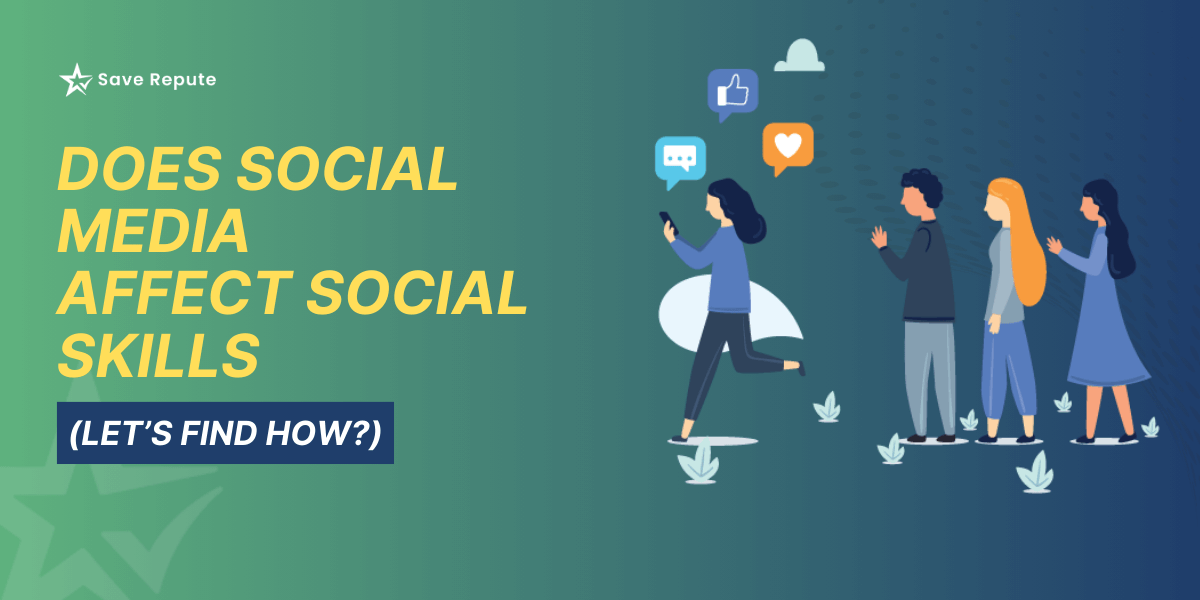As we spend countless hours scrolling through feeds and posting updates, it’s important to consider how these virtual interactions influence our real-world communication abilities. One popular question “Does social media affect mental health?” often intertwines with concerns about our social skills.
Social skills refer to the set of behaviors, actions, and communication techniques we employ in our interactions with others. They are crucial for our personal and professional lives, enabling us to communicate effectively, build strong relationships, and navigate social situations with confidence. They include abilities like active listening, empathy, and verbal communication.
As social media continues to dominate our interactions, understanding its impact on these essential skills becomes increasingly important. So, does social media affect social skills, and how does it impact one’s reputation?
Does Social Media Affect Social Skills?
Yes, social media does affect social skills. While it provides a convenient platform for connecting with others, excessive use can hinder the development of essential social skills like face-to-face communication, empathy, and active listening.
Interactions on social media are often superficial and lack the depth of real-life conversations, which are crucial for building strong, meaningful relationships.
Moreover, the constant distraction and instant gratification offered by social media and social skills can reduce our ability to engage fully in real-world social interactions, potentially leading to issues like social anxiety and impaired social functioning.
Why Does Social Media Affecting Social Skills?
Social media impact on social skills by promoting superficial interactions and reducing opportunities for face-to-face communication. The constant distractions and instant gratification of social media can diminish our ability to engage deeply with others, leading to weakened empathy and reduced proficiency in real-world social interactions.
This shift can hinder the development of critical social skills necessary for building strong, meaningful relationships.
How Does Social Media Affect Social Skills?
i. Communication Skills
Social media can enhance written communication skills as individuals frequently engage in messaging, commenting, and sharing content online.
ii. Empathy Development
Constant exposure to diverse perspectives on social media platforms can help individuals develop empathy by fostering understanding and compassion for others’ viewpoints.
iii. Social Interaction
While social media provides a platform for connecting with others, excessive use can potentially lead to decreased face-to-face interactions, impacting the development of real-life social skills.
iv Digital Literacy
Engaging with social media requires understanding privacy settings, online etiquette, and discerning between credible and misleading information, thus contributing to digital literacy skills.
v. Creativity And Self-Expression
Social media allows for creative expression through the use of filters, photo editing tools, and customizable profiles. This can enhance self-expression and encourage creativity in individuals.
vi. Cyberbullying Awareness
As social media usage increases, so does the prevalence of cyberbullying. Being aware of this issue and actively promoting a positive online environment can help combat cyberbullying and promote kindness on social media platforms.
What Are The Impacts Of Social Media On Youth Positive And Negative?
The impacts of social media on social skills have increased a lot. These impacts are being utilized in both positive or in our areas of concern. Such as:
Positive Impacts Of Social Media On Youth
- Enhanced Connectivity: Social media allows youth to stay connected with friends and family, fostering relationships regardless of geographical distances.
- Access To Information And Learning: Platforms provide vast resources for education and self-improvement, enabling young people to learn new skills and stay informed about global issues.
- Support Networks: Social media offers communities and support groups where youth can find emotional support, share experiences, and receive guidance on various personal and academic challenges.
- Opportunities For Expression: It provides a platform for creative expression through art, writing, and other forms of content, allowing youth to showcase their talents and gain recognition.
Negative Impacts Of Social Media On Youth
- Reduced Social Skills: Excessive use of social media can hinder the development of face-to-face communication skills and emotional intelligence.
- Mental Health Issues: Mostly it’s asked how does social media affects mental health. The answer is that exposure to cyberbullying, social comparison, and unrealistic portrayals of life can lead to anxiety, depression, and low self-esteem, which impacts badly on mental health.
- Distraction And Reduced Productivity: Constant notifications and the addictive nature of social media can distract from academic responsibilities and reduce overall productivity.
- Privacy Concerns: Sharing personal information online can lead to privacy issues and make youth vulnerable to online predators and identity theft.
How Does Social Skills Improve Individual Or Company’s Reputation?
Strong social skills are vital for both individuals and companies in enhancing and maintaining a positive reputation. Effective communication, empathy, and conflict resolution abilities help individuals build trust and credibility, which are essential for reputation repair during reputation crises.
For companies, employees with excellent social skills foster better customer relationships, enhance teamwork, and navigate reputation crises more efficiently. These skills enable organizations to address customer concerns promptly and professionally, leading to improved public perception and long-term reputation management.
Consequently, developing social skills is key to sustaining a favorable reputation and achieving success in both personal and professional spheres.
Conclusion
Social media undeniably affects social skills in various ways. While it offers unparalleled connectivity and opportunities for online interaction, it often comes at the cost of diminishing real-life communication abilities.
The convenience and instant gratification of social media can lead to superficial interactions, reducing the quality of face-to-face conversations and the development of essential social skills like empathy, active listening, and conflict resolution of one’s reputation.
As we navigate the digital age, it is crucial to strike a balance between online and offline interactions to ensure that our social skills remain robust and our relationships meaningful.


